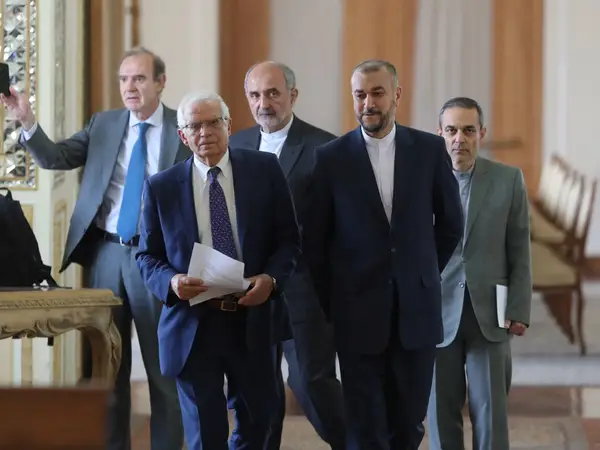Iran’s military cooperation with Russia is “unacceptable,” EU’s foreign policy chief Josep Borrell told the Iranian foreign minister in a phone call on Tuesday.
Borrell tweeted that while speaking about the need to continue dialogue on the JCPOA nuclear deal, he told foreign minister Hossein Amir-Abdollahian that “military cooperation with Russia is unacceptable” and “EU detainees must be freed and human rights respected.”
The European Union, European countries and the United State have been warning Iran against supplying weapons to Russia, since its Shahed Kamikaze drones were deployed by Moscow last year against civilian and military targets in Ukraine. So far, Russia has launched hundreds of these loitering munitions, mostly against infrastructure and centers of population.
In the meantime, France, the United Kingdom and Germany told Iran last week that they plan to retain EU ballistic missile sanctions against Iran set to expire in October, along with a UN ban that was part of the JCPOA deal in 2015.
This signaled that the three countries, signatories of the JCPOA, will technically violate the agreement, which Tehran has already breached with high-level uranium enrichment since 2021.
Iranian government media were silent about the phone conversation Wednesday morning, but the foreign ministry issued two statements, one in Persian and another in English, which were quite different, written for separate audiences.
However, both versions omitted any reference to Borrell’s warning about military cooperation with Russia, and simply mentioned “developments in Ukraine.”
“The Islamic Republic of Iran has always been a supporter of peace and stability in the world, including Ukraine, and in this context, it believes that stopping the war is only possible through political initiatives,” the statement in English quoted Amir-Abdollahian as telling Borrell.
This is hardly the assurance the Europeans seek as they worry about Iranian ballistic missiles finding their way to Russia after October and used against Ukraine, or if the conflict expands beyond the current battlefield.
Tehran’s strategy seems aiming to maintain a certain level of diplomatic interaction with Europe to prevent further sanctions, while strengthening its burgeoning ties with Russia, especially weapons supplies.
British envoy to the United Nations, Barbara Woodward expressed concern Monday that Iran has three times the minimum amount of highly enriched uranium needed to build a nuclear weapon.
Speaking to Iran International’s Maryam Rahmati Woodward said that the regime’s “stockpiles are high, and Iran’s ability to enrich uranium is also very high.”
Woodward is the president of the Security Council in July said, “We'll have a discussion in the Council on the sixth of July on Iran, looking at the Security Council resolution 2231.” The resolution she referred to endorsed the 2015 Iran nuclear agreement, the JCPOA and designated arms limitations on Iran, which might have been violated by drone supplies to Russia.
Referring to the possible reactions by the Islamic Republic in case the UK, France and Germany retain ballistic missile sanctions set to expire in October, Woodward said the situation is causing a lot of concern and that the UK is working closely with France and Germany and the EU on the question of what to do next.
She emphasized that Iran is in “flagrant breach” of resolution 2231, “not least also the way in which it is selling UAVs to Russia for the war in Ukraine.”
“There's quite a lot of concern there and we’ll have a chance to discuss it on the sixth of July,” she added.
